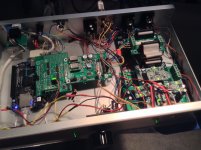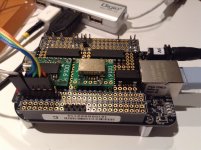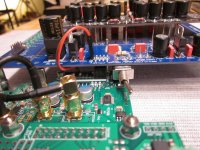BTW, should anyone else be interested in experimenting with a BBB/Botic/NAA combo I have made an image of my eMMC, which you can download here;
https://www.dropbox.com/s/66xnezvdqzftanr/BBB-eMMC-4086.img.gz?dl=0
I'm no Linux guru though so I won't be able to offer much technical help.
Ray
https://www.dropbox.com/s/66xnezvdqzftanr/BBB-eMMC-4086.img.gz?dl=0
I'm no Linux guru though so I won't be able to offer much technical help.
Ray
BTW, should anyone else be interested in experimenting with a BBB/Botic/NAA combo I have made an image of my eMMC, which you can download here;
https://www.dropbox.com/s/66xnezvdqzftanr/BBB-eMMC-4086.img.gz?dl=0
I'm no Linux guru though so I won't be able to offer much technical help.
Ray
Many thanks Ray.
Regards
Ray, a bitrate of the DSD512 is equivalent to a bitrate of the PCM 705.6/768kHz and it does not work on the BBB and IMHO it never will, because it is too much for the BBB. I'm not sure if the Ethernet is able to transfer 6MB/s required for such rates.
The 768kHz rates in the Botic driver are now enabled just for a testing purposes.
The 768kHz rates in the Botic driver are now enabled just for a testing purposes.
Ray, a bitrate of the DSD512 is equivalent to a bitrate of the PCM 705.6/768kHz and it does not work on the BBB and IMHO it never will, because it is too much for the BBB. I'm not sure if the Ethernet is able to transfer 6MB/s required for such rates.
The 768kHz rates in the Botic driver are now enabled just for a testing purposes.
Thanks miero, you may well be right but I want to push this a little further still wrt DSD512.
I'm using a dedicated audio network and the Win10 performance monitoring on the HQPlayer computer shows an almost flat line for the Ethernet loading at around 48mbps so it looks to be holding up. Also DSD512 is only loading the BBB CPU to around 35-40%, which is also promising. I know performance is rather more complex than two simple measurements but my setup is actually 'playing' DSD512 but with the static-like noise.
One aspect I'm not sure about is whether the ESS9018 can actually process DSD512; the only mention I've seen of a 9018 dac with a reference to a DSD512 capability was in a dual mono 9018 chip setup, which presumable halves the load on each individual 9018?
So, I'm thinking the next step is to feed the DSD to a DAC that I know can definitely handle DSD512 rates and the obvious way to do that is with a 'no-dac' low-pass filter approach. As I don't want to disrupt the project I've been using so far, that will mean I need to acquire an additional isolator/reclocker to experiment further, so it may take a little time to assemble a prototype.
I must give PCM768 a try too.
Ray
A few hints, the 768kHz on ES9018 might work only in the OSF bypass mode, because oversampling would require 150MHz clock.
For DSD512 you need 90/98/100MHz clock feeding into ES9018 MCLK pin. And check also voltages on all its regulators. It requires more power.
For DSD512 you need 90/98/100MHz clock feeding into ES9018 MCLK pin. And check also voltages on all its regulators. It requires more power.
@Ray:
Hi Ray ... just a comment: I've experienced what I assume could be similar noises with DSD (and also PCM actually) when my computer was unable to process the DSD data OR my clock somehow was out of sync with the data stream. I reckon that what happened was that the data stream clock and the clock itself was like two watches each having their own "synchronicity" and thus the distances between the rise/fall times of the two signals differed. It sometimes led to a very static/ticking noise.
An idea ...
Cheers,
Jesper
On just a couple of tracks (PCM and DSD) I heard a low level static noise for maybe 10-20secs, which just faded away. On replaying the same tracks the noise was gone? Mostly silences between selections were silent but just occasionally there was a little background noise, again like static. Its entirely possible that this is unrelated to the BBB/Botic/NAA combo.
Hi Ray ... just a comment: I've experienced what I assume could be similar noises with DSD (and also PCM actually) when my computer was unable to process the DSD data OR my clock somehow was out of sync with the data stream. I reckon that what happened was that the data stream clock and the clock itself was like two watches each having their own "synchronicity" and thus the distances between the rise/fall times of the two signals differed. It sometimes led to a very static/ticking noise.
An idea ...
Cheers,
Jesper
For DSD512 you need 90/98/100MHz clock feeding into ES9018 MCLK pin. And check also voltages on all its regulators. It requires more power.
The oscillator on my B3SE is disabled (no trident installed) and the Crystek oscillators on my isolator/reclocker, which are 90/98MHz, connect to the MCLK input.
I will check the voltages as you suggest.
Ray
I don't want my rather 'sad' interest in DSD512 to deter anyone from exploring the BBB/Botic/NAA combo so just to emphasise that it delivers excellent results with PCM at rates up to 384KHz and with DSD at rates upto 12.8MHz (DSD256).
Ray
Ray
...I've experienced what I assume could be similar noises...
Thanks Jesper.
In the scenario you describe would the reclocker get everything 'synced' before the data stream is handed off to the DAC?
I'm thinking I have too many unknowns/variables in the 'equation' at the moment. I've already alluded to the 9018 and not being sure if it is DSD512 capable but at the other end is my HQPlayer PC, which gets heavily loaded when upsampling to DSD512 - maybe a good starting point would be to obtain a DSD512 recording.
Ray
In the scenario you describe would the reclocker get everything 'synced' before the data stream is handed off to the DAC?
Hi Ray ... Yes, ideally it would. But in my experience things sometimes are "mysterious" as I currently have my Amanero & my DDDAC clock running without "sync", i.e. they both run at their own pace. Yet on PCM (currently 192 kHz - haven't had the time to fix this) there's no noises at all (but the sound is less precise than it is with a sync'ed clock/data signal) ... However, when moving to 384 kHz the noises return (I'm pretty sure it's not computer related) and I reckon this is due to inconsistent clock timing intervals on the data & clock signals.
Just FYI, I'm pretty sure the 9018 is capable of DSD512. I once communicated with a person who made this work. Don't know how he set it up though ...
maybe a good starting point would be to obtain a DSD512 recording.
Hmmm... if you find this I would be quite interested in hearing about it ;-)
Cheers,
Jesper
Ray, you might try to use this converter to generate PCM512 files
- PCM-DSD_Converter | PCMDSD.com - Converting PCM to DSD.
- PCM-DSD_Converter | PCMDSD.com - Converting PCM to DSD.
Ray wrote to miero:
As Miska wrote in the previous message, the period size is expected to be proportional to the value of buffer time on the HQP setting (705.6 x [buffer time on HQP] in case of upsampling to DSD512).
So, with 250 ms buffer time, which I believe will cause almost no xrun errors on the side of BBB/Botic/NAA, HQP is expecting the period size to be 705.6 x 250 = 176400. But the actual period size provided by the current patch appears somehow limited to 131072 as shown in the log below:
Despite of this limitation, I've been so far quite satisfied with the SQ of upsampled DSD512 sources from HQP via BBB/Botic/NAA, experiencing only a few xrun errors, once in 20-30 minutes during playing music. However, if the patch can deal a little bit more with the current requirement from HQP, it will be almost perfect.
BTW, shown below are BCK (DSD CLK) waveforms from BBB/Botic/NAA when playing DSD sources upsampled to 128, 256 and 512. Even with DSD512, the waveform appears not bad, doesn't it? 😉
Regards,
Are you considering another patch to explore the optimisation of the buffer further?
As Miska wrote in the previous message, the period size is expected to be proportional to the value of buffer time on the HQP setting (705.6 x [buffer time on HQP] in case of upsampling to DSD512).
So, with 250 ms buffer time, which I believe will cause almost no xrun errors on the side of BBB/Botic/NAA, HQP is expecting the period size to be 705.6 x 250 = 176400. But the actual period size provided by the current patch appears somehow limited to 131072 as shown in the log below:
Code:
[/usr/sbin/networkaudiod] (495): ALSA active channels: 2
[/usr/sbin/networkaudiod] (495): ALSA number of periods: 2
[/usr/sbin/networkaudiod] (495): ALSA period times: 5 - 185760
[/usr/sbin/networkaudiod] (495): ALSA period sizes: 4 - 131072
[/usr/sbin/networkaudiod] (495): ALSA period time: 185759
[/usr/sbin/networkaudiod] (495): ALSA period size: 131072
[/usr/sbin/networkaudiod] (495): ALSA engine started at: 22579200 (22579200)
[/usr/sbin/networkaudiod] (495): enter streaming mode
[/usr/sbin/networkaudiod] (495): ALSA engine running...BTW, shown below are BCK (DSD CLK) waveforms from BBB/Botic/NAA when playing DSD sources upsampled to 128, 256 and 512. Even with DSD512, the waveform appears not bad, doesn't it? 😉
Regards,
Attachments
OK, it might be possible to increase the buffer size even more. I'll try and report status later.
OK, it might be possible to increase the buffer size even more. I'll try and report status later.
Wow, that will be great! Many thanks for paying attention to my post.
Best regards,
OK, it might be possible to increase the buffer size even more. I'll try and report status later.
Thanks for doing this, Miero! When I get a chance, I will try the patches with ALSA speaker crossovers that have been challenging to run in the past.
miero, thanks for the link to the DSD convertor tool, I will check it out, and I appreciate you having another look at the buffer size.
twluke, can I just confirm that, for your DSD512 experiment, you are using cronus/hermes/rhea fitted with 45/49MHz oscillators?
Ray
twluke, can I just confirm that, for your DSD512 experiment, you are using cronus/hermes/rhea fitted with 45/49MHz oscillators?
Ray
twluke, can I just confirm that, for your DSD512 experiment, you are using cronus/hermes/rhea fitted with 45/49MHz oscillators?
Ray
Exactly. I have each of B3 and B3SE connected to BBB/Hermes/Cronus, both with 45 and 49 clocks. Shown below is the B3 in the case, which playing DSD512 as of taking this picture.
Here is a very good news. With each system, I noticed that there had been no xrun errors when playing DSD512 sources with duration of at least one hour, though I wrote that the error might occur once in 20 to 30 minutes in the previous post. Below is the entire log of playing a CD rip from the beginning to the end. Please notice there has been no xrun errors.
Code:
Jul 12 21:06:22 arm networkaudiod[527]: [/usr/sbin/networkaudiod] (527): start 22579200/1/2 [dsd]
Jul 12 21:06:22 arm networkaudiod[527]: [/usr/sbin/networkaudiod] (527): Set channels: 2 (2)
Jul 12 21:06:22 arm networkaudiod[527]: [/usr/sbin/networkaudiod] (527): Set sampling rate: 22579200 (22579200)
Jul 12 21:06:22 arm networkaudiod[527]: [/usr/sbin/networkaudiod] (527): ALSA engine starting...
Jul 12 21:06:22 arm networkaudiod[527]: [/usr/sbin/networkaudiod] (527): ALSA channels: 2 - 8
Jul 12 21:06:22 arm networkaudiod[527]: [/usr/sbin/networkaudiod] (527): ALSA active channels: 2
Jul 12 21:06:22 arm networkaudiod[527]: [/usr/sbin/networkaudiod] (527): ALSA number of periods: 2
Jul 12 21:06:22 arm networkaudiod[527]: [/usr/sbin/networkaudiod] (527): ALSA period times: 5 - 185760
Jul 12 21:06:22 arm networkaudiod[527]: [/usr/sbin/networkaudiod] (527): ALSA period sizes: 4 - 131072
Jul 12 21:06:22 arm networkaudiod[527]: [/usr/sbin/networkaudiod] (527): ALSA period time: 185759
Jul 12 21:06:22 arm networkaudiod[527]: [/usr/sbin/networkaudiod] (527): ALSA period size: 131072
Jul 12 21:06:22 arm networkaudiod[527]: [/usr/sbin/networkaudiod] (527): ALSA engine started at: 22579200 (22579200)
Jul 12 21:06:22 arm networkaudiod[527]: [/usr/sbin/networkaudiod] (527): enter streaming mode
Jul 12 21:06:22 arm networkaudiod[527]: [/usr/sbin/networkaudiod] (527): ALSA engine running...
Jul 12 21:17:01 arm CRON[741]: (root) CMD ( cd / && run-parts --report /etc/cron.hourly)
Jul 12 21:37:27 arm networkaudiod[527]: [/usr/sbin/networkaudiod] (527): data read was short (418688 < 602112)!
Jul 12 21:37:27 arm networkaudiod[527]: [/usr/sbin/networkaudiod] (527): begin disconnection
Jul 12 21:37:27 arm networkaudiod[527]: [/usr/sbin/networkaudiod] (527): ALSA engine stopping...
Jul 12 21:37:27 arm networkaudiod[527]: [/usr/sbin/networkaudiod] (527): ALSA engine stop request...
Jul 12 21:37:28 arm networkaudiod[527]: [/usr/sbin/networkaudiod] (527): ALSA engine stoppedAs my B3 and B3SE are both configured with the DAC clock as it is, the problem may be associated with ASRC function on the side of DACs, though this assumption may not be correct.
Also, I have a Botic board for BBB assembled along with the original instruction by miero at http://bbb.ieero.com/. The board shown below includes 2 sets of 2:1 MUX for DSD/PCM and 44.1/48 clock switching with an isolator (ISO7640fm) for the output of I2S/DSD signals. A CCHD-957 22.9752 and an Epson 24.576 clocks are used for this system. The output connects to B3SE via Teleporter.
This board also works as BBB/Botic/NAA and playing DSD512 is quite stable for a few hours at least. I didn't notice any xrun error and also there has been no complication of noisy background noticed in 45/49 clock systems.
I can not explain why such a difference between 22.5/24.9 and 45/49 clocks can occur in terms of background noise. I'll be happy if there is anyone who can explain it.
Regards,
Attachments
Exactly. I have each of B3 and B3SE connected to BBB/Hermes/Cronus, both with 45 and 49 clocks. Shown below is the B3 in the case, which playing DSD512 as of taking this picture.
Thank you twluke. Some interesting projects you have there too.
I'm looking to buy a Cronus/Hermes/Rhea setup to experiment further and I can now proceed, when Cronus is back in stock, with the standard 45/49MHz oscillators.
THanks for the additional info on DSD512 playback as well.
Cheers
Ray
i2s-lines delayed
Hello Miero,
I managed to get my system working. BBB > Botic5 > Hermes > Cronus > DDDac. I am using external clocks (http://www.diyaudio.com/forums/digi...ow-phase-noise-jitter-crystal-oscillator.html). The system works flawless.
Thank You very much for Your fine piece of art!
As I am using a multichannel all-horn-system, delay lines are essential.
My question is whether I can use three of that four i2s-lines delayed by Botic OS. If that is possible basically, I think the real challenge might be to tell the system the needed delay in msec respectivly fractions of msec valid for all possible sample rates.
I am not interested in digital crossovers whatsoever. So there is no need for that. The signal should not be modified in any way, just delayed.
Regards,
Hans
Hello Miero,
I managed to get my system working. BBB > Botic5 > Hermes > Cronus > DDDac. I am using external clocks (http://www.diyaudio.com/forums/digi...ow-phase-noise-jitter-crystal-oscillator.html). The system works flawless.
Thank You very much for Your fine piece of art!
As I am using a multichannel all-horn-system, delay lines are essential.
My question is whether I can use three of that four i2s-lines delayed by Botic OS. If that is possible basically, I think the real challenge might be to tell the system the needed delay in msec respectivly fractions of msec valid for all possible sample rates.
I am not interested in digital crossovers whatsoever. So there is no need for that. The signal should not be modified in any way, just delayed.
Regards,
Hans
Attachments
- Home
- More Vendors...
- Twisted Pear
- Support for Botic Linux driver




